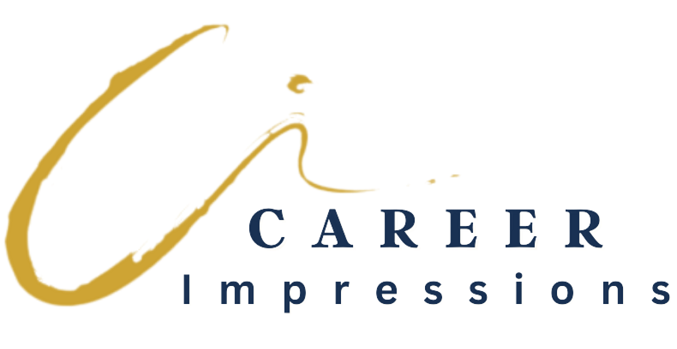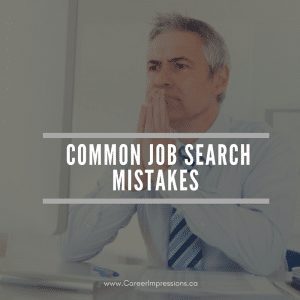
Common Job Search Mistakes You Might Be Making
If you’ve been searching for a job for a period of time, with little to no response or outcome, then chances are you’re making at least one of the following mistakes.
Analyze this checklist to identify which mistakes you’re currently making — and then work to correct them using the provided tips.
Looking for a Job
“Wait, I shouldn’t look for a job?”
Don’t just look for a job — look for a career. A calling. A role that makes you happy.
What are you meant to do? How can you use your skills, education, and experience for maximum benefit? If you aren’t really sure then a great first step – before launching into a search – is to figure this out. Engage a career professional to help.
Truth be told, you may not see your dream position advertised in a job posting online. That doesn’t mean it doesn’t exist. What kinds of problems could you solve for a company? What kind of company needs those problems solved? Investigate how you could solve that problem for that kind of company. Once you identify what you want in a job, create an action plan to go after it!
Not Making It Easy for an Employer to See Your Value
Generic resumes don’t attract employer attention. They just don’t. Instead, you need to show an employer how you can add value to their company. Value is best demonstrated through proof of skills and results. Don’t just tell an employer ‘I’m an excellent team leader’ – this is weak. Instead, give them specific, concrete, measurable examples of how you’ve led teams to success.
In addition, you need to customize your resume for each and every job application. You wouldn’t use a hammer to tighten a screw, would you? Well, you can’t use the same resume to apply for vastly different jobs. For example, you might be interested in pursuing roles as an administrative assistant and a sales assistant. Trouble is, each role has unique requirements that your resume must address.
Figure out what the key components of the job are, and then showcase how you can do those things in your resume. Quantify achievements and spoon-feed the reader exactly what they want to hear. Yes, make your value known! If you make it easier for the reader to identify value quickly, you enhance your chances.
Quitting Your Job Instead of Keeping It While You Find a Better One
Maybe your friend gave you this advice: “Don’t quit your job until you have a new one.” That friend was onto something.
It’s controversial, but hiring managers and recruiters confirm that it’s easier to find a job if you’re currently employed. Job seekers who have a job are more attractive candidates. Maybe it’s because unemployment can make you (seem) desperate. But study after study shows that currently employed candidates are hired more frequently than unemployed jobseekers. This becomes a big challenge if you have been out of work for quite some time…and most job searches take just that – time!
Consider executing your job search plan before pulling the plug on your current role altogether.
Forgetting That People Hire People
It’s easy to get overwhelmed by the technology in a job search. Technology can feel like it’s removing a bit of humanity from the hiring process, but it can be a necessary evil. To succeed in a modern job search you need to know how to make your resume ATS-friendly (meaning, helping it get through the Applicant Tracking System software that many large companies use). You need to know how to use LinkedIn in the job search. You may also need technology to build networks and visibility on social media platforms.
Yet you also need people! Don’t forget that ultimately, people hire people. Connecting to the right person at a company can make the difference between getting hired and not getting a response to your application. The right person can introduce you, refer you, or provide you with fresh leads. So include technology in your search, but build – and leverage – relationships too.
Networking The Wrong Way
Second only to not using your network at all is using it incorrectly. Your network is comprised of all the people that you know and also all the people that they know. Don’t just think that because you don’t personally know anyone who works for Company ABC that you’re out of luck using your network. Ask the people you know who they know.
Just remember that networking requires relationship building and relationship management. If you haven’t talked to someone for five years, don’t let your first contact with them be, “Hey, can you help me get a job at your company?”. Author Harvey Mackay has a great book on this, which summarizes networking perfectly: “Dig Your Well Before You’re Thirsty.”
Unintentionally Broadcasting Your Job Search
If you’re currently employed, be mindful of how this might come across to your current employer or team. Don’t set up a LinkedIn profile and send out so many connection requests that you go from 0 to 500 connections in a week. Be thoughtful about your job search, and deliberate.
Turn off the setting that sends notifications to others on LinkedIn, especially as you build your profile. Don’t apply to job postings that don’t specify the employer because that perfect job you’re applying for might be your current position! And be sure to let any recruiters you’re working with know that you’re conducting a confidential job search.
Not Asking Good Questions at the Interview
You’re finishing a job interview. The interviewer asks if you have any questions. You don’t ask any. They shake your hand and you leave. You’ve missed a huge opportunity. Instead of just walking away….
Ask questions about the role to demonstrate interest and understanding.
Ask questions to support your decision.
Thank the interviewer for his or her time.
Tell them you’re very interested in the position. Then ask what the next step is: “Is there anything else you need from me at this point? What’s the next step? Can I follow up with you next week if I haven’t heard back from you? Would you prefer I call or send you an email?”. Close the interview confidently.
Not Following All the Way Through or Adjusting Your Strategy
Sometimes you’ll apply for a job, get selected for an interview, and not get the offer. That’s going to happen. The question is: What can you learn from it? If you don’t follow through or apply feedback, you can’t use the experience to get closer to your dream job. So follow up! Adjust your strategy!
Improve your tools and work harder on your value-delivery (interview performance is a common hold-up for those not getting the offer). Don’t be afraid to reach out to the hiring manager and thank them for the opportunity to meet with them. Ask for their honest advice about what you could do better in future interviews. Ask about the person who got hired. What qualifications, skills, education, or experience did they have that you didn’t?
Sometimes you won’t be able to get an answer to your questions — but imagine how helpful it would be if you did!
Click here to read 7 more executive job search mistakes and how to fix them.

